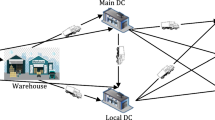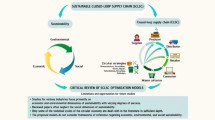Abstract
This paper established a three-level supply chain composed of plants, distribution centers, and retailers, and studied the location of distribution centers in the supply chain network and the carbon emissions during processing and transportation. In a random and fuzzy environment, the research objective is to minimize the supply chain’s cost and carbon emission. The multi-objective uncertain equilibrium model of the green supply chain network is established by introducing opportunity constraints, and the stability of the model can be enhanced by using variance function and risk function. Then this research integrated the theory of stochastic programming and fuzzy mathematical programming and employed Monte Carlo simulation; the sample mean approximation, chance-constrained programming and fuzzy expectation to deal with the random parameters and fuzzy parameters in the model so that the uncertain model is clarified. Further, the authors used the hierarchical method, the weighted ideal point method, restriction method, and weighted ideal point method to solve the multi-objective model. Finally, a numerical example is provided to demonstrate the feasibility of the model.





Similar content being viewed by others
References
Zheng, M.M., Li, W., Liu, Y., Liu, X.: A Lagrangian heuristic algorithm for sustainable supply chain network considering CO2 emission. J Cleaner Prod (2020). https://doi.org/10.1016/j.jclepro.2020.122409
Seungrae L., Seung J P.: Who should lead carbon emissions reductions? Upstream vs. downstream firms. International Journal of Production Economics. 230, 1-18 (2020)
Yu, H., Solvang, W.D.: A fuzzy-stochastic multi-objective model for sustainable planning of a closed-loop supply chain considering mixed uncertainty and network flexibility. J Cleaner Prod 266, 1–20 (2020)
Setyo Budi Kurniawan et al.: Current state of marine plastic pollution and its technology for more eminent evidence: A review. J Cleaner Prod. 278(2021)
Rouzbeh, A., Seyed, M.S., Seyed, M.H., Ali, Z.: Designing a stochastic multi-objective simulation-based optimization model for sales and operations planning in built-to-order environment with uncertain distant outsourcing. Simulation Model Pract Theory (2020). https://doi.org/10.1016/j.simpat.2020.102103
Abdel-Basset, M., Mohamed, R., Sallam, K., Elhoseny, M.: A novel decision-making model for sustainable supply chain finance under uncertainty environment. J Cleaner Prod (2020). https://doi.org/10.1016/j.jclepro.2020.122324
Saghaei, M., Ghaderi, H., Soleimani, H.: Design and optimization of biomass electricity supply chain with uncertainty in material quality, availability and market demand. Energy 197, 1–16 (2020)
Karmazyn, A., Balcerzak, M., Perlikowski, P., Stefanski, A.: Chaotic synchronization in a pair of pendulums attached to driven structure. Int J Non Linear Mech (2018). https://doi.org/10.1016/J.IJNONLINMEC.2018.05.013
Srivastava, S.K.: Green supply chain management: a state-of-the-art literature review. Int J Manag Rev 9, 53–80 (2007)
Aghezzaf, E.: Capacity planning and warehouse location in supply chains with uncertain demands. J Oper Res Soc 56, 453–462 (2005)
Takagi, T., Sugeno, M.: Fuzzy identification of systems and its applications to modeling and control. IEEE Trans Syst Man Cybern 15, 116–132 (1985). https://doi.org/10.1109/TSMC.1985.6313399
Govindan, K., Khodaverdi, R., Vafadarnikjoo, A.: Intuitionistic fuzzy based DEMATEL method for developing green practices and performances in a green supply chain. Expert Syst Appl 42(20), 7207–7220 (2015)
Green Jr., K.W., Zelbst, P.J., Meacham, J., Bhadauria, V.S.: Green supply chain management practices: impact on performance. Supply Chain Manag Int J 17(3), 290–305 (2012)
Hervani, A.A., Helms, M.M., Sarkis, J.: Performance measurement for green supply chain management. Benchmark Int J 12(4), 330–353 (2005)
Hsu, C.W., Kuo, T.C., Chen, S.H., Hu, A.H.: Using DEMATEL to develop a carbon management model of supplier selection in green supply chain management. J Clean Prod 56, 164–172 (2013)
Laosirihongthong, T., Adebanjo, D., Choon Tan, K.: Green supply chain management practices and performance. Ind Manag Data Syst 113(8), 1088–1109 (2013)
Wang, Y., Shen, H., Karimi, H.R., Duan, D.: Dissipativity-based fuzzy integral sliding mode control of continuous-time T-S fuzzy systems. IEEE Trans Fuzzy Syst 26, 1164–1176 (2018). https://doi.org/10.1109/TFUZZ.2017.2710952
Safa, A., Abdolmalaki, R.Y., Shafiee, S., Sadeghi, B.: Adaptive nonsingular terminal sliding mode controller for micro/nanopositioning systems driven by linear piezoelectric ceramic motors. ISA Trans 77, 122–132 (2018). https://doi.org/10.1016/J.ISATRA.2018.03.027
Hajek, P., Olej, V.: Adaptive intuitionistic fuzzy inference systems of Takagi-Sugeno type for regression problems. 206–216 (2012)
Hajek, P., Olej, V.: Defuzzification methods in intuitionistic fuzzy inference systems of Takagi-Sugeno type: The case of corporate bankruptcy prediction. In: 2014 11th international conference on fuzzy systems and knowledge discovery (FSKD). pp. 232–236. IEEE (2014)
Lin, Y., Zhou, X., Gu, S., Wang, S.: The Takagi-Sugeno intuitionistic fuzzy systems are universal approximators. In: 2012 2nd international conference on consumer electronics, communications and networks (CECNet). pp. 2214–2217. IEEE (2012)
Pecora, L.M., Carroll, T.L.: Synchronization in chaotic systems. Phys Rev Lett 64, 821–824 (1990). https://doi.org/10.1103/PhysRevLett.64.821
Chen, X., Park, J.H., Cao, J., Qiu, J.: Adaptive synchronization of multiple uncertain coupled chaotic systems via sliding mode control. Neurocomputing 273, 9–21 (2018). https://doi.org/10.1016/J.NEUCOM.2017.07.063
Chen, W., Xu, M., Xing, Q., Cui, L.: A fuzzy demand-profit model for the sustainable development of electric vehicles in China from the perspective of three-Level service chain. Sustainability 12(16), 1–17 (2020)
Tan, Y., Ji, X., Yan, S.: New models of supply chain network design by different decision criteria under hybrid uncertainties. J Ambient Intell Humanized Comput 10(7), 2843–2853 (2019)
Ghafarimoghadam, A., Ghayebloo, S., Pishvaee, M.S.: A fuzzy-budgeted robust optimization model for joint network design-pricing problem in a forward − reverse supply chain: the viewpoint of third-party logistics. Comput Appl Math 38(4), 1–29 (2019)
Hadi, M.B., Jonathan, P.: Accelerated sample average approximation method for two-stage stochastic programming with binary first-stage variables. Appl Mathemat Model 41, 582–595 (2017)
Yau, H.-T., Shieh, C.-S.: Chaos synchronization using fuzzy logic controller. Nonlinear Anal Real World Appl 9, 1800–1810 (2008). https://doi.org/10.1016/J.NONRWA.2007.05.009
Turan, P., Nimet, Y.P., Eren, Ö.: A new tradeoff model for fuzzy supply chain network design and optimization. Human Ecol Risk Assessment: Int J 19(2), 492–514 (2013)
Li, J.: Design of multi-objective fuzzy programming for low carbon supply chain network based on credibility. Syst Engin Theory Pract 35(6), 12–35 (2015)
Castillo, O., Kutlu, F., Atan, Ö.: Intuitionistic fuzzy control of twin rotor multiple input multiple output systems. J. Intell. Fuzzy Syst. (2019). https://doi.org/10.3233/JIFS-179451.
Acknowledgements
This work supported by the Beijing Key Laboratory of Megaregions Sustainable Development Modelling, Capital University of Economics and Business (No. MCR2019QN09) and China Postdoctoral Science Foundation (No. 2019M660700).
Author information
Authors and Affiliations
Corresponding author
Rights and permissions
About this article
Cite this article
Yu, Z., Khan, S.A.R. Green Supply Chain Network Optimization Under Random and Fuzzy Environment. Int. J. Fuzzy Syst. 24, 1170–1181 (2022). https://doi.org/10.1007/s40815-020-00979-7
Received:
Revised:
Accepted:
Published:
Issue Date:
DOI: https://doi.org/10.1007/s40815-020-00979-7




